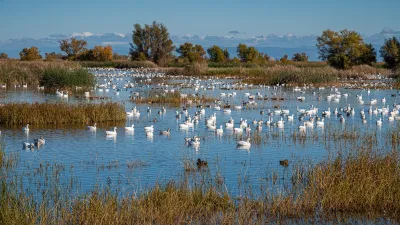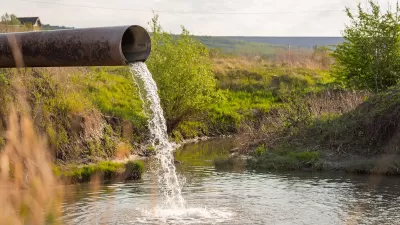The D.C. Water and Sewer Authority wants to revise a settlement reached eight years ago with environmental groups that would have seen the agency build three huge tunnels to manage storm water runoff. The Authority would like to build green systems.
Today, the Supreme Court will hear arguments in a case meant to establish who's to blame for polluted storm waters entering L.A.'s waterways. Within miles of the court, residents and officials in Washington are debating how to manage the same issue, with the D.C. Water and Sewer Authority seeking to back out of an agreement reached eight years ago to settle a federal lawsuit with local environmental groups. The Authority had agreed to build three giant tunnels to stop pipes from overflowing during heavy storms.
"But now," says reporter Darryl Fears, "the three-tunnel solution is in doubt, and activists, engineers and bureaucrats are arguing once again about the best path to cleaner waters. Although digging is underway for the first tunnel, D.C. Water wants to put the other two on hold and instead see whether rain gardens, retention ponds and grass rooftops can soak up as much storm-water runoff as the pipes can store."
"Among local environmental activist groups, a verdict on the request is already clear: Don’t do it. Some are enraged; others have expressed dismay about the proposal."
Although the green system has the potential for offering benefits beyond filtering storm water (such as cooling and beautifying the city), many are concerned about D.C. Water's request for an additional eight years to build and test an experimental green infrastructure project. "Opponents say that if the green pilot project wins approval, billions of gallons of sewage would pour into the Potomac and Rock Creek for eight years while D.C. Water conducts its tests."
The debate over the proposal has already cost the head of the D.C. Department of the Environment (DDOE), Christophe Tulou, his job after he expressed reservations about how well the green infrastructure project could perform.
FULL STORY: D.C. debates best path to cleaner waterways

Alabama: Trump Terminates Settlements for Black Communities Harmed By Raw Sewage
Trump deemed the landmark civil rights agreement “illegal DEI and environmental justice policy.”

Planetizen Federal Action Tracker
A weekly monitor of how Trump’s orders and actions are impacting planners and planning in America.

The 120 Year Old Tiny Home Villages That Sheltered San Francisco’s Earthquake Refugees
More than a century ago, San Francisco mobilized to house thousands of residents displaced by the 1906 earthquake. Could their strategy offer a model for the present?

Rural Population Grew Again in 2024
Americans continued to move to smaller towns and cities, resulting in a fourth straight year of growth in rural areas.

Safe Streets Grants: What to Know
This year’s round of Safe Streets for All grant criteria come with some changes.

Rural Missouri Transit Service Could Lose State Funding
OATS Transit offers low-cost rides to primarily elderly rural residents with little or no access to other transportation options.
Urban Design for Planners 1: Software Tools
This six-course series explores essential urban design concepts using open source software and equips planners with the tools they need to participate fully in the urban design process.
Planning for Universal Design
Learn the tools for implementing Universal Design in planning regulations.
Clanton & Associates, Inc.
Jessamine County Fiscal Court
Institute for Housing and Urban Development Studies (IHS)
City of Grandview
Harvard GSD Executive Education
Toledo-Lucas County Plan Commissions
Salt Lake City
NYU Wagner Graduate School of Public Service





























